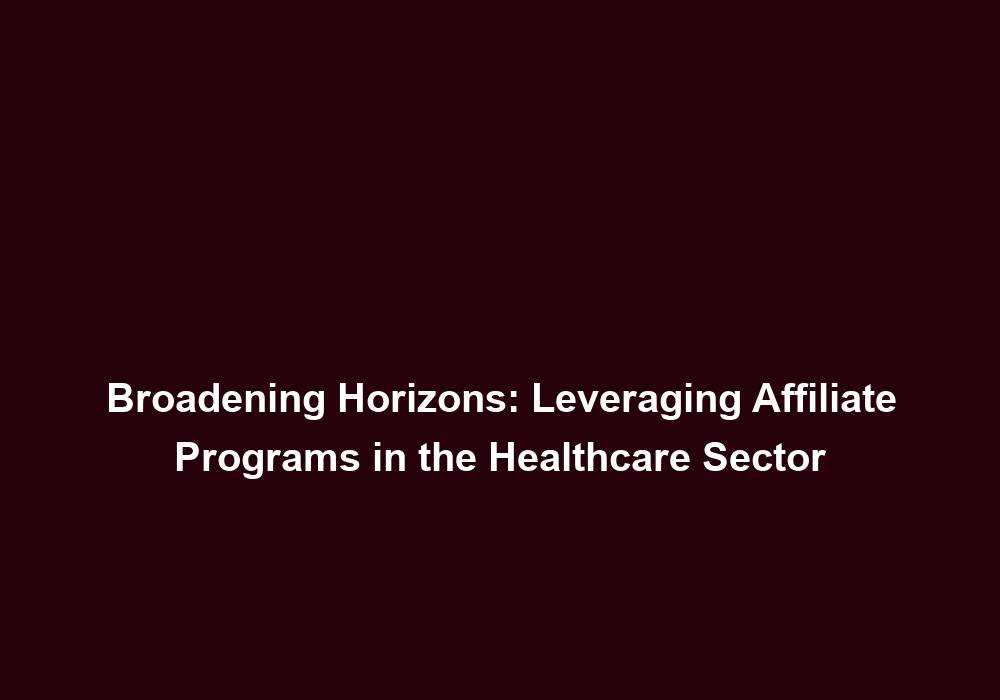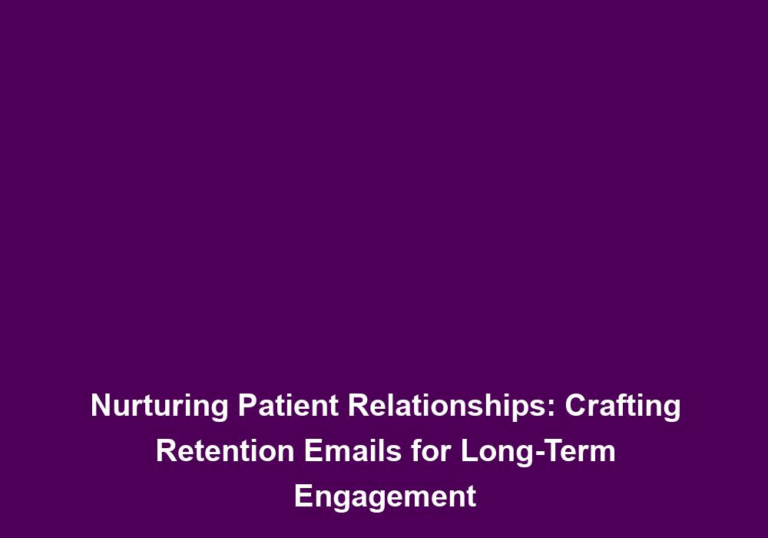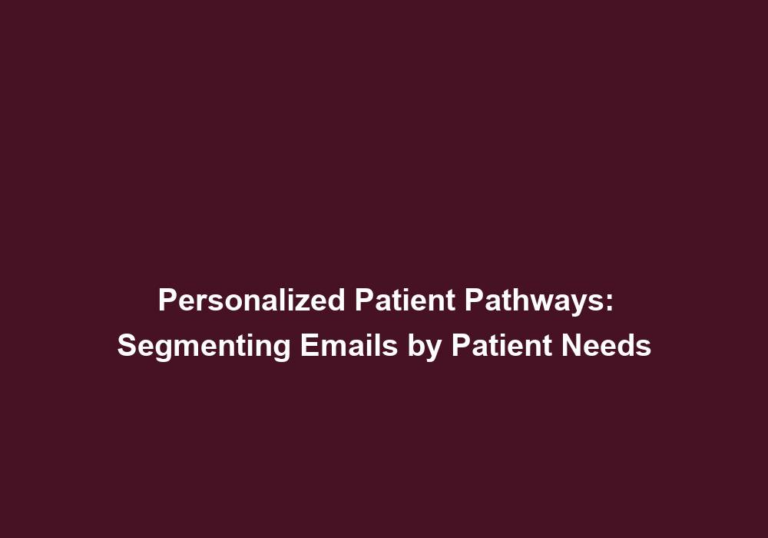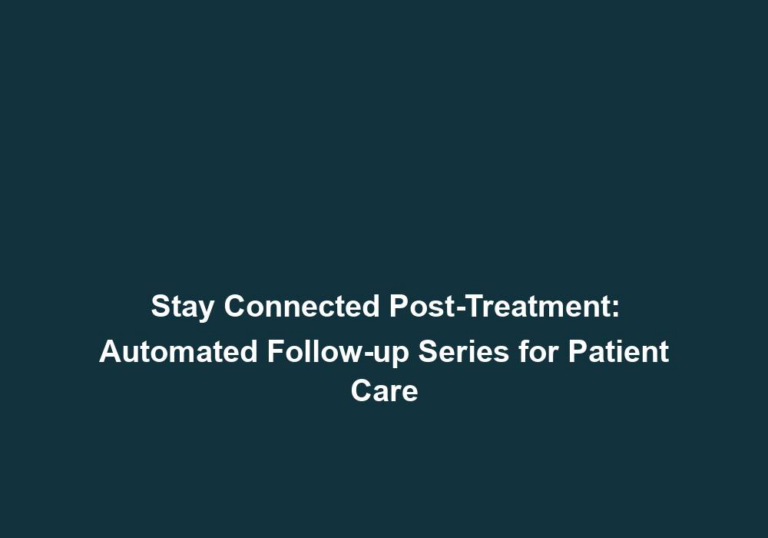Broadening Horizons: Leveraging Affiliate Programs in the Healthcare Sector
Affiliate marketing has become an increasingly popular and effective method for businesses to generate revenue and increase brand exposure. In recent years, the healthcare sector has also recognized the potential of affiliate programs to expand their reach and establish mutually beneficial partnerships. By leveraging affiliate programs, healthcare organizations can tap into a vast network of affiliates to promote their products and services, ultimately driving growth and enhancing their overall marketing strategy.
Understanding Affiliate Programs
Before delving into the specifics of leveraging affiliate programs in the healthcare sector, it is essential to have a clear understanding of what affiliate programs entail. In simple terms, affiliate programs allow businesses to partner with individuals or organizations (affiliates) who promote their products or services on their websites, social media platforms, or other digital channels. Affiliates earn a commission for each successful referral or sale made through their unique affiliate links.
Affiliate programs provide healthcare organizations with a cost-effective way to market their products or services. Instead of investing heavily in traditional advertising methods, healthcare organizations can rely on the affiliates to promote their offerings and only pay commissions when a referral or sale is made. This payment structure ensures that the marketing budget is allocated to tangible results, making it a highly efficient and measurable method.
The Growing Potential in the Healthcare Sector
The healthcare industry is experiencing a significant transformation in the digital landscape. As more people turn to the internet for medical information, health-related products, and services, the potential for affiliate marketing in the healthcare sector is growing rapidly. From medical equipment suppliers to health and wellness brands, various healthcare organizations can benefit from the utilization of affiliate programs.
Healthcare organizations can tap into the growing market by partnering with affiliates who have established online platforms. These affiliates already have an existing audience who trust their recommendations and are more likely to engage with the healthcare organization’s products or services. By strategically placing well-designed banners, links, and sponsored content, affiliates can drive targeted traffic to the healthcare organization’s website or specific landing pages.
Benefits of Leveraging Affiliate Programs in the Healthcare Sector
- Increased brand visibility: By partnering with affiliates who have established online platforms, healthcare organizations can tap into their existing audience and increase brand awareness. Through well-placed banners, links, and sponsored content, affiliates can help drive targeted traffic to the healthcare organization’s website or specific landing pages.
- Affiliates can expose the healthcare organization’s brand to a wider audience, including individuals who may not have been previously aware of their products or services.
- Through strategic collaborations, affiliates can create engaging content that highlights the unique value propositions of the healthcare organization, further increasing brand visibility.
- Cost-effective marketing strategy: Affiliate programs offer a cost-effective marketing approach for healthcare organizations. Instead of investing heavily in traditional advertising methods, affiliates take on the role of promoting the products or services, allowing the healthcare organization to pay commissions only when a referral or sale is made.
- This cost-effective approach allows healthcare organizations to allocate their marketing budget more efficiently, focusing on results-driven strategies rather than upfront costs.
- By leveraging affiliate programs, healthcare organizations can significantly reduce their customer acquisition costs, as they only pay for successful conversions.
- Targeted marketing: Affiliates often have a niche audience or specialized focus. This allows healthcare organizations to target specific demographics or individuals interested in particular health-related topics. By partnering with affiliates that align with their target market, healthcare organizations can ensure their products or services reach the right audience.
- Affiliates with expertise in specific healthcare fields can help healthcare organizations reach highly targeted audiences interested in those specific areas.
- Healthcare organizations can collaborate with affiliates who cater to specific demographics, such as mothers, athletes, or individuals with specific medical conditions, to tailor their marketing messages and offerings accordingly.
- Performance-based payment structure: Unlike many traditional marketing strategies, affiliate programs operate on a performance-based payment structure. Healthcare organizations only pay affiliates when desired actions are achieved, such as a sale or lead generation. This ensures that the marketing budget is allocated to tangible results, making it a highly efficient and measurable method.
- With a performance-based payment structure, healthcare organizations can easily track the return on investment (ROI) of their affiliate marketing efforts.
- The performance-based structure incentivizes affiliates to actively promote the healthcare organization’s products or services, as their earnings are directly tied to their performance.
- Building trust and credibility: Affiliates who have built a loyal following in the healthcare industry can significantly contribute to establishing trust and credibility for healthcare organizations. When a respected affiliate recommends a product or service, it lends credibility to the offering, increasing the chances of conversion and customer satisfaction.
- Affiliates with a strong reputation in the healthcare industry can help healthcare organizations build trust with their target audience.
- By leveraging the trust and credibility of affiliates, healthcare organizations can overcome potential barriers to entry and establish themselves as reliable providers of high-quality products or services.
Implementing Affiliate Programs in the Healthcare Sector
To successfully leverage affiliate programs in the healthcare sector, healthcare organizations should consider the following steps:
- Identify potential affiliates: Research and identify affiliates in the healthcare industry who align with your organization’s values and target audience. This can include healthcare bloggers, social media influencers, medical professionals, or health-related websites.
- Conduct thorough research to identify affiliates who have a strong online presence and a loyal following in the healthcare industry.
- Look for affiliates who share similar values and have an audience that aligns with the target market of the healthcare organization.
- Establish mutually beneficial partnerships: Reach out to potential affiliates and propose a partnership. Clearly outline the benefits they can expect, such as commission rates, promotional materials, and any exclusive offers or discounts they can extend to their audience.
- Clearly communicate the value proposition of the partnership, emphasizing how it can benefit both the healthcare organization and the affiliate.
- Offer competitive commission rates and provide affiliates with promotional materials and exclusive offers to incentivize their participation.
- Provide affiliates with necessary resources: Support your affiliates by providing them with the necessary resources to effectively promote your products or services. This can include high-quality banners, unique affiliate links, informative content, and any training or assistance required.
- Create a resource hub or affiliate portal where affiliates can access promotional materials, track their performance, and find helpful resources.
- Offer training sessions or webinars to educate affiliates on the healthcare organization’s products or services, enabling them to effectively promote them to their audience.
- Track and measure performance: Implement a reliable tracking system to monitor the performance of your affiliate program. This will allow you to measure the success of individual affiliates, evaluate the effectiveness of your marketing strategies, and make necessary adjustments to optimize results.
- Utilize affiliate tracking software or platforms that provide comprehensive analytics and reporting capabilities.
- Regularly review performance metrics such as click-through rates, conversion rates, and revenue generated by each affiliate to identify top-performers and areas for improvement.
- Regularly communicate and optimize: Keep an open line of communication with your affiliates to address any questions, concerns, or suggestions they may have. Regularly review performance data and collaborate with affiliates to optimize marketing efforts and maximize conversions.
- Schedule regular check-ins with affiliates to discuss their performance, provide feedback, and address any challenges they may be facing.
- Continually optimize your marketing strategies based on the insights obtained from performance data and feedback from affiliates.
Conclusion
In a digital age dominated by online marketing strategies, leveraging affiliate programs in the healthcare sector can offer numerous benefits for organizations aiming to broaden their horizons. By partnering with affiliates, healthcare organizations can tap into their existing audience, increase brand visibility, and drive growth. However, it is crucial to approach affiliate programs strategically, selecting the right affiliates, providing necessary resources, and continually optimizing efforts. With careful planning and execution, affiliate programs can be a powerful tool for healthcare organizations to thrive in the ever-evolving healthcare industry.






